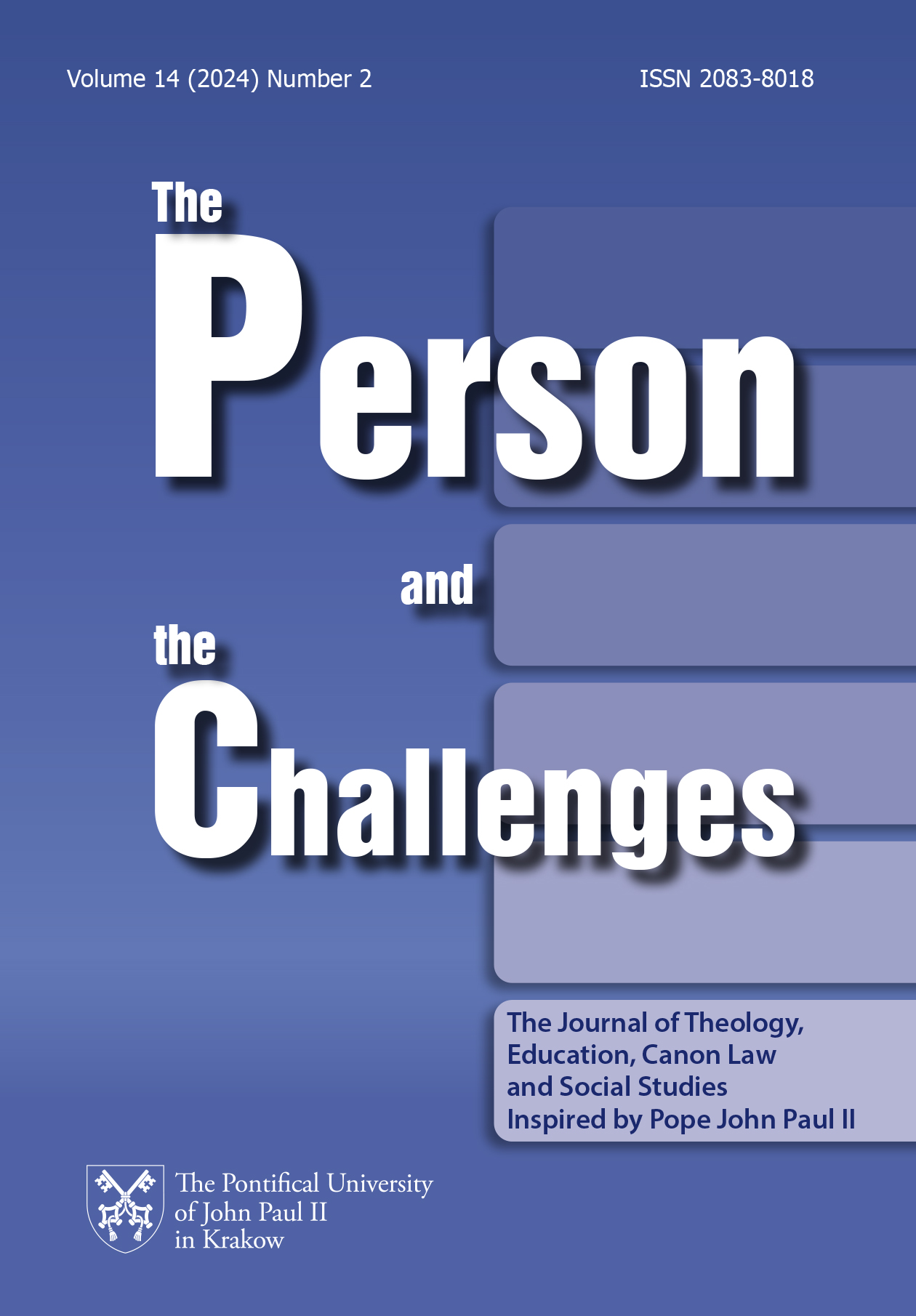Procedimento come principio inespresso. Proceeding as an Unexpressed Principle
DOI:
https://doi.org/10.15633/pch.14204Keywords:
Principles of law, ecclesiology of the Second Vatican Council, theory of law, juridical reasoning, canon law traditionAbstract
This paper discusses the possibility pertaining to the field of a new principle of law theorised, according to the communion ecclesiology issued by the Second Vatican Council. By considering the accurate proceeding disposition, the author accepts that a new principle constitutes necessary rules for the correct functioning of the canon law system and, as such, are inducted from the legal reasoning of those entitled to take legal decisions in the process of applying the law, especially the judiciary. Furthermore, it could constitute an integrative tool of the entire legal system. Such a new principle is understood to be of great value, because of the significant role assigned to principles in the theory of law in general. In every case, a new principle evokes by, and alludes to, values that govern the entire canon law science.
References
Baura E., Il Sistema delle invalidita (inesistenza e nullita, annullabilita e rescindibilita) dell’atto giuridico, in: Aa. Vv., L’atto giuridico nel diritto canonico, Città del Vaticano 2002, Libreria Editrice Vaticana, pp. 121–141.
Canosa J., I principi e le fasi del procedimento amministrativo nel diritto canonico, “Ius Ecclesiae” 18 (2006), pp. 551–577.
Condorelli O., La recezione della tradizione nella codificazione latina. Il caso del potere dei vescovi, in: E. Baura, N. Álvarez de las Asturias, T. Sol (eds.), La codificazione e il diritto della Chiesa, Milano 2017, Giuffrè Ed., pp. 121–168.
Corecco E., Valore dell’atto “contra legem”, “Ius Canonicum” 15 (1975) 30, pp. 237–257.
García Failde J.J., Nuevo derecho procesal canónico, 3 ed., Salamanca 1993, Universidad Pontificia de Salamanca Ed.
Grola A.C., ‘precedente giudiziale’ in: Enciclopedia giuridica, vol. XXIII, Roma 1990, Giuffrè Ed., pp. 1–15.
Gherri P., L’autotutela amministrativa come supplemento di conoscenza: la Remonstratio canonica (can. 1732–1734 CIC), “Apollinaris” 85 (2012), pp. 7–72.
Gherri P., Introduzione al diritto amministrativo canonico. Metodo, Milano 2018, Giuffrè Ed.
Grocholewski Z., Il sistema dei ricorsi e la giurisdizione dei tribunali amministrativi, in: J. Canosa (ed.), I principi per la revisione del Codice di diritto canonico. La ricezione giuridica del Concilio, Milano 2000, Giuffrè Ed., pp. 461–499.
Ioannes Paulus PP. II, Constitutio Apostolica Sacra disciplina leges, 25 ianuarii 1983, AAS LXXV (1983), Pars II, pp. I–XIII.
Ioannes Paulus PP. II, Allocutio a Summo Pontifice in aula supra porticum vaticana Basilica habita, ad novum Codicem Iuris Canonici, paucis ante diebus promulgatum, publice exhibendum, AAS LXXV (1983), Pars I, pp. 461–462.
Llobell J., La diaconia funzionale della potesta giudiziaria della Segnatura Apostolica con gli altri organismi della Curia Romana: l’ecclesialita dei principi processuali, il Contenzioso amministrativo e le competenze giudiziali nei confronti della Segnatura Apostolica, Coll. Studi giuridici, n. LXXXIX, Città del Vaticano 2010, Libreria Editrice Vaticana.
Michowicz P., Ancora sul concetto di diritto soggettivo nell’ordinamento della Chiesa, “Annales Canonici” 17 (2021) 2, pp. 83–100.
Miletti M.N., Stylus iudicandi. Le raccolte di ‘decisiones’ del Regno di Napoli in eta moderna, Napoli 1998, Jovene Ed.
Molloy T.E., The Theological Foundation of Ecclesiastical Due Process, “CLSA Proceedings” 41 (1979), pp. 60–67.
Pagallo U., Introduzione alla filosofia digitale. Da Leibniz a Chaitin, Torino 2005, Giappichelli Ed.
Panizzolo F., La potesta di governo nella vita consacrata, Venezia 2009, Marcianum Press.
Pino G., Il puzzle dei diritti indisponibili, “Diritto & Questioni Pubbliche” 22 (2022), pp. 119–135.
Romano S., L’Ordinamento giuridico, 2 ed., Firenze 1945, Quodlibet Ed.
Vladár V., Stylus Romana curia ako inšpiračny zdroj v histórii a dnes, in: P. Salák jr., L. Mrázková (eds.), Ius honorarium — rímské magistratury a jejich činnost, Brno 2019, Scientia Ed., pp. 78–117.
Downloads
Published
Issue
Section
License
Copyright (c) 2024 Przemysław Michowicz

This work is licensed under a Creative Commons Attribution 4.0 International License.
Authors who publish with this journal agree to the following terms:
- Authors retain the copyright and full publishing rights without restrictions, and grant the journal right of first publication with the work simultaneously licensed under a Creative Commons Attribution 4.0 International License that allows others to share the work with an acknowledgement of the work's authorship and initial publication in this journal.
- Authors are able to enter into separate, additional contractual arrangements for the non-exclusive distribution of the journal's published version of the work (e.g., post it to an institutional repository or publish it in a book), with an acknowledgement of its initial publication in this journal.
- Authors are permitted and encouraged to post their work online (e.g., in institutional repositories or on their website) prior to and during the submission process, as it can lead to productive exchanges, as well as earlier and greater citation of published work (See The Effect of Open Access).

